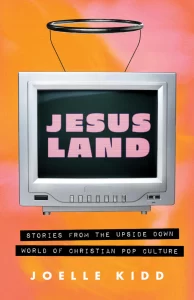Publishing Talks Interview with Jack David of ECW Press
January 6, 2025 by David
Filed under Ebooks and Digital Publishing, Publishing History, PublishingTalks, Technology, The Future
 I began Publishing Talks a number of years ago as a series of conversations with book industry professionals and others involved in media and technology. Most of these interviews originally involved the future of publishing, books, and culture, talking with people in the book industry about how publishing is evolving in the context of technology, culture, and economics.
I began Publishing Talks a number of years ago as a series of conversations with book industry professionals and others involved in media and technology. Most of these interviews originally involved the future of publishing, books, and culture, talking with people in the book industry about how publishing is evolving in the context of technology, culture, and economics.
Later this series broadened to include conversations to go beyond the future of publishing. In an effort to document the literary world, I’ve talked with a variety of editors, publishers and others who have been innovators and leaders in independent publishing in the past and into the present.
These conversations have been inspirational to me on many levels. I have gotten to speak with visionaries and entrepreneurs, as well as editors and publishers who have influenced and changed contemporary literature and culture. I’ve also had the opportunity to speak with a number of friends and colleagues I have met or worked with during the many years I have been in the book business.
More recently, I’ve been talking to book folks about what is going on in publishing today, quite often about the changes in marketing and promotion that have marked all media industries as social media has overwhelmed traditional media, creating an extremely complex and constantly changing environment.
One thing is certain about publishing – there are no final answers, but there are many really important questions that we should be asking all the time.
ECW is a terrific independently owned and operated Canadian publisher, now celebrating its 50th anniversary. I’ve known Jack David, one of its co-founders, for a long time. He is a really smart guy, and notably has managed (with the help of partners and a great staff) to create a thriving independent publishing business across the five decades the book business has changed the most in its history. It is decidedly difficult to be a book publisher in any time and place, but I think being commercially viable for a half century and being based in a relatively small market country with a geographical spread greater than the US makes ECW’s success even more remarkable. ECW does things its own way, to its advantage, in the long run. Unlike most publishers, they publish their own audio books. And their list is built the old fashioned way – through the enthusiasms of its editors. There is much here to be admired and learned from, not just for book publishers, but for anyone interested in media in the modern era.
Talking to Jack about books and culture is always fun. Getting to talk to him about book publishing for this podcast was and is a distinct pleasure I hope you will enjoy as much as I did.
Editor’s note: this interview runs longer than most (60 minutes)
Here is what ECW says about itself:
“ECW is Entertainment. ECW is Culture. ECW is Writing.”
Publishers Weekly recognizes ECW Press as one of the most diversified independent publishers in North America. ECW Press has published close to 1,000 books that are distributed throughout the English-speaking world and translated into dozens of languages. In the next year, we’ll release 50+ new titles and will continue to support and promote a vibrant backlist that includes poetry and fiction, pop-culture and political analysis, sports books, biography, and travel guides. Books by writers whose names you know and love — and by those who we’re very pleased to introduce for the first time. Who are we? After three decades, we still get asked about our name, those three little letters: ECW.
At first the acronym was self-descriptive: Essays on Canadian Writing (the name of the journal of literary criticism we started in 1974). But as the company grew and changed, our name, in our minds, also changed. We’ve heard the company called Essential Canadian Writing, Excellent Contemporary Writing, or, more recently, Extreme Cutting-Edge Writing. And these names have been, and still are, appropriate. But now we realize that each of those letters represents a particular strain of ECW Press’s diverse passions — Entertainment, Culture, Writing.
Podcast: Play in new window | Download
Publishing Talks: An Interview with Shouvik Paul of CopyLeaks
July 27, 2023 by David
Filed under PublishingTalks, Technology
 Publishing Talks began as a series of conversations with book industry professionals and others involved in media and technology, mostly talking about the future of publishing, books, and culture. I’ve spent time talking with people in the book industry about how publishing is evolving in the context of technology, culture, and economics.
Publishing Talks began as a series of conversations with book industry professionals and others involved in media and technology, mostly talking about the future of publishing, books, and culture. I’ve spent time talking with people in the book industry about how publishing is evolving in the context of technology, culture, and economics.
Later this series grew to include conversations that go beyond the future of publishing. In an effort to document the literary world, I’ve talked with a variety of editors, publishers and others who have been innovators and leaders in independent publishing in the past and into the present.
These conversations have been inspirational to me on many levels. I have gotten to speak with visionaries and entrepreneurs, as well as editors and publishers who have influenced and changed contemporary literature and culture. I’ve also had the opportunity to speak with a number of friends and colleagues I have met over the many years I have been in the book business.
I met Shouvik Paul a number of years ago when he was working for SharedBook, a company for whom I did some consulting work. He is a really smart guy and has been involved in a variety of technology related start ups during his career. Shouvik is currently the Chief Operating Officer of Copyleaks Inc., an award-winning AI-based text analysis company whose primary work is to identify potential plagiarism and paraphrasing across nearly every language, detect AI-generated content, and provide generative AI governance and compliance solutions. For obvious reasons, this kind of technology will be of interest to all kinds of publishers and content owners.
CopyLeaks has been working in AI for years, and now that AI in many different applications will become crucial for the book industry to understand and apply, I thought this would be a great opportunity for me and for Publishing Talks listeners to learn more about where this is all headed from someone who knows alot more than most of the rest of us.
I think this conversation will spur your thinking in a variety of ways. It certainly has inspired me to learn more about AI and how it can be used, what the risks of using it are, and how we need to think about AI both within the book business and in our overall culture. Don’t be surprised if this changes your outlook on the way AI will affect our business and hopefully it will inspire you as to learn more about it as well. The book industry cannot afford not to recognize how this technology will change our lives in so many ways.
Shouvik lives in Manhattan with his two daughters; he wanted me to note here that they refer to him as “That guy who has to stop and pet every dog that passes by” — which is a pretty great recommendation, in my view.
Podcast: Play in new window | Download
Publishing Talks: Interview with Jane Friedman
May 10, 2022 by David
Filed under Ebooks and Digital Publishing, Publishing History, PublishingTalks, The Future
 Publishing Talks started as a series of conversations with book industry professionals and others involved in media and technology, mostly talking about the future of publishing, books, and culture. It was great fun talking with people in the book industry about the evolution of publishing in the context of technology, culture, and economics.
Publishing Talks started as a series of conversations with book industry professionals and others involved in media and technology, mostly talking about the future of publishing, books, and culture. It was great fun talking with people in the book industry about the evolution of publishing in the context of technology, culture, and economics.
Later this series broadened considerably. In the past few years, I’ve talked with a variety of editors, publishers and others who have been innovators and leaders in independent publishing and bookselling in the past and into the present.
These conversations have been inspirational to me. I have had the pleasure of speaking with visionaries and entrepreneurs, editors, publishers and others who have influenced and changed contemporary literature and culture. I’ve also had the opportunity to speak with a number of friends and colleagues in the book business.
I’ve not had occasion to speak with the same person twice during all the years this series has gone on. But I really wanted to speak again with Jane Friedman, whose insights and knowledge I thoroughly respect, and get her sense of the current state of publishing and bookselling, especially as it affects writers and independent publishers. Our last Publishing Talks conversation was in 2015! Much has changed since then, and there was much for us to talk about.
Jane publishes a terrific newsletter I read religiously called The Hot Sheet. Her most recent book is The Business of Being a Writer (University of Chicago Press). Collaborating with The Authors Guild, she wrote The Authors Guild Guide to Self-Publishing. Her website offers a wide range of services and information for writers: “I report on the book publishing industry and help authors understand the business. I’ve been working in book publishing since the 1990s, but my views are not from the 1990s. Amidst rapid change in the industry, writers need honest and unbiased guidance to make the best decisions for their careers. I hope to offer you a signal amidst the noise.”
And I hope this conversation does the same.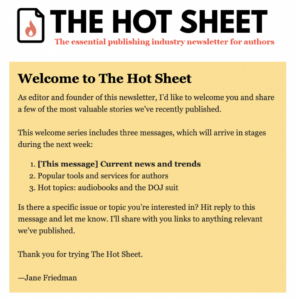
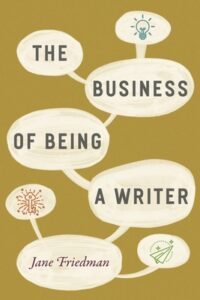
Podcast: Play in new window | Download
Publishing Talks: Interview with Jeff Deutsch of Seminary Co-op Bookstores
October 12, 2021 by David
Filed under PublishingTalks, The Future
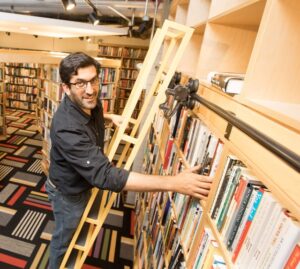 Publishing Talks began as a series of conversations with book industry professionals and others involved in media and technology, mostly talking about the future of publishing, books, and culture. I’ve spent time talking with people in the book industry about how publishing is evolving in the context of technology, culture, and economics.
Publishing Talks began as a series of conversations with book industry professionals and others involved in media and technology, mostly talking about the future of publishing, books, and culture. I’ve spent time talking with people in the book industry about how publishing is evolving in the context of technology, culture, and economics.
Some time back, this series broadened to include conversations that go beyond the future of publishing. In an effort to document the literary world, I’ve talked with a variety of editors, publishers and others who have been innovators and leaders in independent publishing in the past and into the present.
These conversations have been inspirational to me on many levels. I have gotten to speak with visionaries and entrepreneurs, as well as editors and publishers who have influenced and changed contemporary literature and culture. I’ve also had the opportunity to speak with a number of friends and colleagues I have met over the many years I have been in the book business.
This week’s podcast is one I am really excited about. Jeff Deutsch is the director of Chicago’s Seminary Co-op Bookstores, which calls itself the first not-for-profit bookstore in the United States whose mission is devoted to bookselling (there are other nonprofit bookstores of course, generally components of literary centers, like Beyond Baroque in Venice, California, Woodland Pattern in Milwaukee, and Writers and Books in Rochester, NY are examples).
Last spring I read a report of a Book Industry Study Group panel that included Jeff, and what he talked about immediately caught my attention. Deutsch was reported to have said that the model of bookselling we’ve inherited needs to be rethought: just facilitating more sales, more efficiently, is not the way for bookstores to survive. A bookstore that actually means something to readers will need to carry a deep backlist and to spend time helping readers discover new voices, new texts.
During that panel Deutsch said, “The publishing world and distributors—what you value is not our ability to sell books,” because independent bookstores can never sell in the same volume as Amazon. “Yet we all know how important bookstores are,” he said. As publishers and booksellers once knew, developing readerships for books and authors takes time and devotion that have been boiled out of the entire process now.
Jane Friedman’s outstanding book industry newsletter Hot Sheet compared Jeff’s approach to the Slow Food movement (I think that idea makes sense – I wrote a manifesto for publishers a few years ago on the idea of Slow Publishing, but never developed it enough to publish). Nina Barrett, owner of Bookends & Beginnings in Illinois (which has filed a lawsuit against Amazon), also on the BISG panel said “I think it’s like Alice Waters talking for decades about a sustainable food ecosystem and ultimately revolutionizing the food industry that way. That’s the point we’re at.”
As Jane pointed out, “independent booksellers will lose every time if they base their worth on the mere transactional value of selling books. His stance—that bookselling has a deeper meaning and cultural value—is indeed how boutique and online retailers outside of the Amazon ecosystem are positioning themselves for success.”
Deutsch also said, “We should figure out models that support the work that we’re trying to do, not shoehorn this other model of retail that is really just about buying and selling and not about culture….We all have vocational awe, but couldn’t we have vocational awe and still make a decent living?”
This conceptual framework resonates with me and I think is worthy of much more discussion. Why shouldn’t there be a nonprofit bookselling sector to promote literary and other noncommercial books and authors, just as there is a nonprofit theater? Why should we continuously try to fit a crucially important culture activity into a commercial model, and always fail?
I hope that hearing Jeff talk about this concept will help stimulate further discussion and concrete action. Please feel free to comment and if you are interested in helping, please be in touch.
Connect to the Seminary Co-op Bookstores website here.
Before joining the Co-op Deutsch was the director of stores for the Stanford Bookstore Group and prior to that managed the Cal Student Store at the University of California, Berkeley.

Podcast: Play in new window | Download
Publishing Talks: David Wilk interviews Brian O’Leary about The Opportunity in Abundance
March 18, 2012 by David
Filed under Ebooks and Digital Publishing, PublishingTalks, Technology, The Future
 In this series of interviews, called Publishing Talks, I talk to book industry professionals and other smart people about the future of publishing, books, and culture. This is a period of disruption and change for all media businesses. How will publishing evolve as our culture is affected by technology, climate change, population density, and the ebb and flow of civilization and economics?
In this series of interviews, called Publishing Talks, I talk to book industry professionals and other smart people about the future of publishing, books, and culture. This is a period of disruption and change for all media businesses. How will publishing evolve as our culture is affected by technology, climate change, population density, and the ebb and flow of civilization and economics?
I hope these Publishing Talks conversations will help us better understand the outlines of what is happening in publishing, books and reading culture, and how we can ourselves both understand and influence the future of books and reading.
Brian O’Leary’s Magellan Media provides research, benchmarking and business planning services that help smaller and medium-sized publishers manage and grow their top- and bottom-line results. Magazine, book and association publishers often engage Magellan to improve their content workflows across platforms and uses.
Brian frequently is called on to make industry presentations and he blogs regularly about critical matters in publishing (both for books and magazines). I follow his work closely. One of the pieces he published in October, 2011, called the Opportunity in Abundance, spurred me to talk to him once again for Publishing Talks. Today we live in an age of content abundance. Most publishers realize this as it affects them on a daily basis.
Brian has laid out an analysis of content abundance that I think will enable publishers to make sense of this new reality, and how to work successfully within it. His understanding of digital content should help publishers create their own contextual framework for thinking about how to do business in a radically new environment. It’s a great piece to read (as are his related essays), and this interview should help amplify and explain further some of his ideas. Of course, we did not always stick to the subject at hand, but were able to cover a wide range of related ideas that I hope will be interesting and useful to anyone interested in the current state of the publishing business.
Here is the specific link to his essay The Opportunity in Abundance. Brian is a terrific writer – he’s always able to be clear, insightful and understandable. I recommend reading through the archives at Magellan Media. And I also interviewed him in 2009, when we talked about piracy, another issue he has written about with great incisiveness.
Podcast: Play in new window | Download
Publishing Talks: David Wilk interviews Mike Shatzkin
February 28, 2011 by David
Filed under Ebooks and Digital Publishing, Publishing History, PublishingTalks, Technology, The Future
 In this series of interviews, called Publishing Talks, I have been talking to book industry professionals and other smart people about the future of publishing, books, and culture. This is a period of disruption and change for all media businesses. We must wonder now, how will publishing evolve as our culture is affected by technology, climate change, population density, and the ebb and flow of civilization and economics?
In this series of interviews, called Publishing Talks, I have been talking to book industry professionals and other smart people about the future of publishing, books, and culture. This is a period of disruption and change for all media businesses. We must wonder now, how will publishing evolve as our culture is affected by technology, climate change, population density, and the ebb and flow of civilization and economics?
I hope these Publishing Talks conversations can help us understand the outlines of what is happening in the publishing industry, and how we might ourselves interact with and influence the future of publishing as it unfolds.
These interviews give people in and around the book business a chance to talk openly about ideas and concerns that are often only talked about “around the water cooler,” at industry conventions and events, and in emails between friends and they give people inside and outside the book industry a chance to hear first hand some of the most interesting and challenging thoughts, ideas and concepts being discussed by people in the book business.
Mike Shatzkin, is the founder and operator of a well known book industry consulting business called The Idea Logical Company. He’s also a blogger extraordinaire who writes incisively about issues in the book industry at The Shatzkin Files and who is never afraid to make public predictions about the future of books and the book business he knows so well, having essentially grown up in the business from an early age. He is an organizer of conferences, and a frequent speaker at publishing industry gatherings large and small.
The description of Idea Logical on its website sums up Mike’s role pretty succinctly: “The Idea Logical Company consults to book publishers and their trading partners about the changes engendered by digital transformation to every component of the value chain.” Mike has spent thirty years addressing all sorts of issues and problems for publishing and retailing clients of all sizes. In recent years, his work has focused on the changes created for the publishing industry by a variety of new and emerging digital technologies. He was an early advocate of digital publishing, and also established the concept of “verticality” or subject specific publishing as a way to organize publishing around digital technologies.
Beyond his interest and expertise in publishing, Mike is also a writer and an active entrepreneur. In this interview, we did not discuss any of his baseball related writing, editing, publishing and website development – if we had, it’s likely we would have used up all our time talking about our mutually shared passion, a subject in which Mike has also had an entire career simultaneously with his consulting work and constant thinking and analysis about books, publishers, readers and the business that serves them.
In my opinion, Mike talks just as clearly and intelligently, if not more so, than he writes, which given his writing talents, is saying alot. We certainly had a lot of fun in this conversation, which I think will be useful and interesting to anyone interested in the future of books and reading. As Mike says in his latest blog post: “Sometimes, and it would seem quite often these days, the future comes faster than you expected it.”
Podcast: Play in new window | Download
Publishing Talks: David Wilk interviews Deborah Emin
August 16, 2010 by David
Filed under Ebooks and Digital Publishing, PublishingTalks, The Future
 In this series of interviews, called Publishing Talks, I have been talking to book industry professionals about the future of publishing, books, and culture. This is a period of disruption and change for all media businesses. How will publishing evolve as our culture is affected by technology, climate change, population density, and the ebb and flow of civilization and its economics?
In this series of interviews, called Publishing Talks, I have been talking to book industry professionals about the future of publishing, books, and culture. This is a period of disruption and change for all media businesses. How will publishing evolve as our culture is affected by technology, climate change, population density, and the ebb and flow of civilization and its economics?
I hope these Publishing Talks conversations will help us understand the outlines of what is happening, and how we might ourselves interact with and influence the future of publishing as it unfolds.
These interviews give people in the book business a chance to talk openly about ideas and concerns that are often only talked about “around the water cooler,” at industry conventions and events, and in emails between friends and they give people inside and outside the book industry a chance to hear first hand some of the most interesting and challenging thoughts, ideas and concepts being discussed by people in the book business.
I learned about Deborah Emin from an article about Sullivan Street Press and her “throwback” program called the Itinerant Book Show. Deborah and colleagues (they call themselves “bookies”) travel to towns in the midwest as far as Iowa bringing books they select to events in art galleries, bars, coffee shops and the like. Because they are featuring only books they have read and liked, it’s pretty easy to understand how they are connecting successfully with audiences. And as she points out on the Sullivan Street website, the real key is what Deborah as a publisher and writer can learn about audiences. Face to face, one to one. It’s invaluable intelligence for anyone concerned with understanding how a literary community works.
All of this resonates for me. Her story reminded me of work some of us were doing more than thirty years ago, bringing books by new authors and publishers to booksellers and audiences around the country. In the late 1970’s what was then called the Coordinating Council of Literary Magazines (still going strong and known as CLMP) sponsored a number of grassroots efforts to bring independently published poets and writers into bookstores, which involved personal visits to bookstores, libraries, schools and even bars to sell books.
There were programs in North Dakota (where a budding young writer named Louise Erdrich interned), Rochester, NY, Minneapolis-St. Paul (where I was) and other locales, all sharing a commitment to connecting innovative new writers to new audiences, sometimes, one person at a time. Many then young publishers still publishing today, were introduced to their audiences through those early efforts.
So is everything old new again? I think the spirit of independent publishing continues. Writers find their readers, and readers their books one at a time, after all. The magic of literary discovery still requires the kind of personal effort that Deborah Emin and the Itinerant Book Show put forth. Which is also the kind of personal connection forged by booksellers with their customers. Whether the books are printed by hand on custom paper using handpresses, or created digitally using HTML or ePub, learning about a book you will love is ultimately about a deep connection between the writer, and the reader, with one or more intermediaries making the hand off.
Sullivan Street Press consists of Deborah Emin, an editor and writer, Ron Lebow, a computer technologist, a business development professional and also a writer. It’s a pretty interesting and obviously fertile group of minds and talents. The work they are doing is challenging and rewarding, and offers valuable lessons for publishers of any size and ambition.
Podcast: Play in new window | Download
Publishing Talks: David Wilk interviews David Steinberger
July 4, 2010 by David
Filed under Publishing History, PublishingTalks, The Future
 In this series of interviews, called Publishing Talks, I have been talking to book industry professionals about the future of publishing, books, and culture. This is a period of disruption and change for all media businesses. How will publishing evolve as our culture is affected by technology, climate change, population density, and the ebb and flow of civilization and its economics? Publishing Talks interviews help us understand the outlines of what is happening, and how we might ourselves interact with and influence the future of publishing as it unfolds.
In this series of interviews, called Publishing Talks, I have been talking to book industry professionals about the future of publishing, books, and culture. This is a period of disruption and change for all media businesses. How will publishing evolve as our culture is affected by technology, climate change, population density, and the ebb and flow of civilization and its economics? Publishing Talks interviews help us understand the outlines of what is happening, and how we might ourselves interact with and influence the future of publishing as it unfolds.
These interviews give people in the book business a chance to talk openly about ideas and concerns that are often only talked about “around the water cooler,” at industry conventions and events, and in emails between friends and they give people inside and outside the book industry a chance to hear first hand some of the most interesting and challenging thoughts, ideas and concepts being discussed by people in the book business.
David Steinberger is well known now as the CEO and President of The Perseus Books Group. Perseus is in many ways, a creation of the unusual business conditions that have marked the book industry over the past dozen years. The company began as a relatively small independent book publisher, growing over time via acquisitions of usually unwanted or under appreciated business units of other companies. Today it is made up of about 10 seperate imprints. Its six main publishing divisions include PublicAffairs (non-fiction), Running Press (fiction and non-fiction titles), Basic Books (non-fiction), Da Capo (non-fiction), Vanguard (fiction and non-fiction), and Avalon Travel (travel guides). Perseus also publishes academic books, including college textbooks from Westview Press.
In addition to publishing, Perseus acquired Client Distribution Services (renamed Perseus Distribution), Consortium (specializing in mostly independent literary and political presses) and most of the assets of Publishers Group West (PGW) in daring and innovative bankruptcy purchase, so that today it is by far the largest distributor of client publishers in the North American market. With Steinberger as CEO and Joe Mangan as COO (and aided by strong financing from its parent company), Perseus has crafted what appears to be a very successful strategy for navigating changeful times, including an early and deep commitment to digital publishing, a diverse set of publishing imprints, a decentralized management system based around a set of core services shared by internal resources as well as clients, and a willingness to experiment with new ideas (including Vanguard’s no-advance, high royalty publishing program as well as a variety of interesting digital initiatives).
In my conversation with David Steinberger, I wanted to learn more about how he sees Perseus today, as well as a sense of his vision for the future, not only of Perseus itself, but the publishing industry as a whole. I think listeners interested in the future of publishing and book distribution will find this discussion useful and interesting on a number of levels.
Podcast: Play in new window | Download
Publishing Talks: David Wilk interviews Dan Halpern
June 8, 2010 by David
Filed under Publishing History, PublishingTalks, The Future
 In this series of interviews, called Publishing Talks, I have been talking to book industry professionals about the future of publishing, books, and culture. This is a period of disruption and change for all media businesses. How will publishing evolve as our culture is affected by technology, climate change, population density, and the ebb and flow of civilization and its economics? Publishing Talks interviews help us understand the outlines of what is happening, and how we might ourselves interact with and influence the future of publishing as it unfolds.
In this series of interviews, called Publishing Talks, I have been talking to book industry professionals about the future of publishing, books, and culture. This is a period of disruption and change for all media businesses. How will publishing evolve as our culture is affected by technology, climate change, population density, and the ebb and flow of civilization and its economics? Publishing Talks interviews help us understand the outlines of what is happening, and how we might ourselves interact with and influence the future of publishing as it unfolds.
These interviews give people in the book business a chance to talk openly about ideas and concerns that are often only talked about “around the water cooler,” at industry conventions and events, and in emails between friends and they give people inside and outside the book industry a chance to hear first hand some of the most interesting and challenging thoughts, ideas and concepts being discussed by people in the book business.
In May, 2010, Dan Halpern was honored by the Poetry Society of America along with the Academy of American Poets and NYU’s Creative Writing Program on the occasion of the fortieth anniversary of the Ecco Press (the publishing imprint of which he is the founder). Aside from being well-known as a successful publisher of quality literature, Dan is himself a poet, writer and editor of a number of important anthologies. Along with his mentor, Paul Bowles, he founded the literary magazine Antaeus (out of which Ecco originally was born). He is currently the editorial director of Ecco Press, which is now an imprint of HarperCollins. He has received many grants and awards, including fellowships from the Guggenheim Foundation and the National Endowment for the Arts.
While I do not know Dan well, we have some friends in common and shared experiences as editors of literary magazines and a deep interest in poetry. I wanted to talk to him for the Publishing Talks series, as he has been able to maintain his deep commitment to publishing important literary work, continuing to write and edit himself, within a commercial context during a period of massive change in the publishing business. I think his perspective on books and writing, past, present, and future, is a valuable one, and instructive for many of us in the book business whose expectations are being severely challenged by the state of the current book marketplace. Dan’s commitment and dedication to writing, ideas, art and culture inform his outlook on the past, present and future of publishing and books.
Podcast: Play in new window | Download
Publishing Talks: David Wilk interviews Jason Allen Ashlock
May 31, 2010 by David
Filed under PublishingTalks, The Future
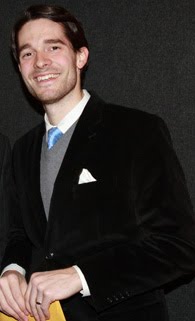 In this series of interviews, called Publishing Talks, I have been talking to book industry professionals about the future of publishing, books, and culture. This is a period of disruption and change for all media businesses. How will publishing evolve as our culture is affected by technology, climate change, population density, and the ebb and flow of civilization and its economics? Publishing Talks interviews help us understand the outlines of what is happening, and how we might ourselves interact with and influence the future of publishing as it unfolds.
In this series of interviews, called Publishing Talks, I have been talking to book industry professionals about the future of publishing, books, and culture. This is a period of disruption and change for all media businesses. How will publishing evolve as our culture is affected by technology, climate change, population density, and the ebb and flow of civilization and its economics? Publishing Talks interviews help us understand the outlines of what is happening, and how we might ourselves interact with and influence the future of publishing as it unfolds.
These interviews give people in the book business a chance to talk openly about ideas and concerns that are often only talked about “around the water cooler,” at industry conventions and events, and in emails between friends and they give people inside and outside the book industry a chance to hear first hand some of the most interesting and challenging thoughts, ideas and concepts being discussed by people in the book business.
I first read about the new literary agency, Movable Type Literary Group established by Jason Ashlock and his partner Meredith Dawson a few months ago. I’ve wondered for awhile now about the role of agents in the changing landscape of book publishing, and evidently so have Jason and Meredith. Along with an NEA based graph on their home page “Books are not dead,” they have composed the following statement of purpose and occasion:
“We have arrived, as Harold Bloom might say, belatedly.
The scene is established, the paradigms rigid, the machine stubborn and aging. Now more than half a millennium removed from the prima typographicae incunabula, “the first infancy of printing,” a chorus now announces the swift and coming death of the published word and the end of book history. But crisis and opportunity are concurrent, and the instability of one paradigm leads to the creation of another. We work in publishing at a moment of both belatedness and birth, when the trend of all future events is being determined. We aim, with many of our friends and colleagues, to confront the crisis of the moment and from the upheaval to design and shape a future.”
When I ran across Jason at a publishing event in Manhattan, we arranged to talk. I wanted to hear in his own words what this new agency will be all about. I think alot of what he says here will resonate for listeners of this podcast. Certainly, it makes sense for the role of the agent to be transformed, and to help lead the transformation of relationships between author, publisher and audience that is emerging now. It looks like Movable Type has an opportunity to create a new model for its own clients, and by example, for others as well. Maybe because, like many others looking at an established industry with new eyes, Jason Ashlock has an opportunity to create a new paradigm.
Podcast: Play in new window | Download



